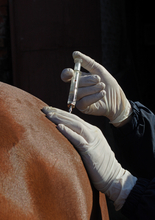The Equine Disease Communication Center continues its work to protect horses and the horse industry from the threat of infectious diseases in North America by seeking out and reporting real time information about disease outbreaks similar to how the Centers for Disease Control and Prevention alerts the human population about diseases in people.

Horse vaccinations - Key to contagious disease prevention
The goal of the Equine Disease Communication Center is to alert the horse industry about disease outbreak information to help mitigate and prevent the spread of disease.
The goal of the EDCC is to alert the horse industry about disease outbreak information to help mitigate and prevent the spread of disease. During July, the EDCC has reported outbreaks of contagious horse diseases from coast to coast.
Three new cases of Eastern Equine Encephalitis have been confirmed in South Carolina as of 7/12/16. The State Veterinarianâs office received laboratory confirmation of three new case of EEE as of 7/12/16. #1 was a TWH located in Dorchester County, #2 was a 13 year old pony located in Horry County and #3 was a 2 year old QH located in Kershaw County.
These cases are the first cases in Dorchester and Kershaw counties and the third case in Horry County. None of the 3 horses survived. The total number of confirmed cases in SC in 2016 is now 8.
In addition, the Virginia Department of Agriculture and Consumer Services announced the second case of Eastern Equine Encephalitis in a Virginia horse this year. The horse, a thoroughbred, was from Suffolk.
The horse had been vaccinated and is recovering. Without vaccination the mortality rate is 80 to 90 percent. VDACS received confirmation of the diagnosis from the National Veterinary Services Laboratory in Ames, Iowa on July 8.
